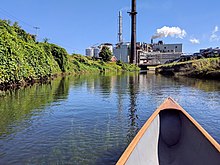Glens Falls Feeder Canal
Glens Falls Feeder Canal | |
 "The Combine" : a series of five locks on the Feeder Canal in Fort Edward, New York | |
| Location | Warren / Washington counties, New York, USA |
|---|---|
| Coordinates | 43°18′28.5″N 73°37′36″W / 43.307917°N 73.62667°W |
| Built | 1822 |
| NRHP reference No. | 85003401[1] |
| Added to NRHP | October 25, 1985 |
[2]The Glens Falls Feeder Canal is a canal from Glens Falls, New York, United States through Hudson Falls and into Fort Edward.[3] It is seven miles (11 km) long and delivers water from above Glens Falls on the Hudson River to the highest point of the Champlain Canal. The Feeder Canal Heritage Trail runs along a large part of the canal.
History
[edit]The first Feeder Canal was constructed around 1822 at the foot of Fort Edward Hill, to direct water from the Hudson River one-half mile (0.80 km) east to the Champlain Canal. When a flood destroyed part of the dam across the Hudson River at Fort Edward, the feeder canal failed to provide enough water.[4]
In 1824 a new dam was built across the Hudson River upstream of Glens Falls and digging of the Glens Falls Feeder Canal began. It ran seven miles (11 km) eastward to join the Champlain Canal, guaranteeing adequate water at its highest elevation.[4]
In 1832, the Feeder Canal was widened and deepened to accommodate boat traffic as well. Thirteen masonry locks were constructed to overcome the 130-foot (40 m) vertical drop east of Sandy Hill (now called Hudson Falls). This engineering feat includes the "Five Combines" Locks in Hudson Falls (at the intersection of Pine Street and Burgoyne Avenue.[4] The Combine Locks lower water 55 vertical feet (17 m). The locks were 15 feet (4.6 m) wide and 100 feet (30 m) long; these dimensions controlled the size of canal boats in the Champlain Canal system while the locks were in use. The present-day Champlain Barge Canal eliminated the need for boat traffic on the Feeder Canal in the early 1900s.
Present day
[edit]Today the canal is still an important source of water for the Champlain Canal as well as the Finch Pruyn & Company Paper Mill, which lies just east of the start of the Canal in Glens Falls. It is maintained by the New York State Canal Corporation.

The canal is a popular destination for canoeing and kayaking. A seven-mile (11 km) long park/trail along the old canal towpath is frequented by tourists and joggers and cyclists. The canal was added to the National Register of Historic Places in 1985. The not-for-profit Feeder Canal Alliance was formed in 1987 to preserve, promote and maintain the Feeder Canal.[5]
References
[edit]- ^ "National Register Information System". National Register of Historic Places. National Park Service. April 15, 2008.
- ^ Jillbrown11407 (2022-08-25), English: This photo was taken from the GlensFalls Feeder Canal trail that runs beside the waterway during August., retrieved 2024-02-25
{{citation}}: CS1 maint: numeric names: authors list (link) - ^ "Bicycle Trail Map". Feeder Canal Alliance. Archived from the original on 2008-11-19. Retrieved 2008-03-13.
- ^ a b c "Feeder Canal History". The Feeder Canal Alliance. Archived from the original on 2015-06-26. Retrieved 2009-03-13.
- ^ "The Feeder Canal Alliance Website". Archived from the original on 2009-03-12. Retrieved 2009-03-13.
External links
[edit]- Historic American Engineering Record (HAER) No. NY-200, "Glens Falls Feeder, Sluice, Along south side of Glens Falls Feeder between locks 10 & 20, Hudson Falls, Washington County, NY", 26 photos, 23 data pages, 3 photo caption pages
- Canals in New York (state)
- Canals on the National Register of Historic Places in New York (state)
- Historic American Engineering Record in New York (state)
- Tourist attractions in Washington County, New York
- Tourist attractions in Warren County, New York
- Transportation buildings and structures in Washington County, New York
- Transportation buildings and structures in Warren County, New York
- Canals opened in 1822
- National Register of Historic Places in Warren County, New York
- 1822 establishments in New York (state)




